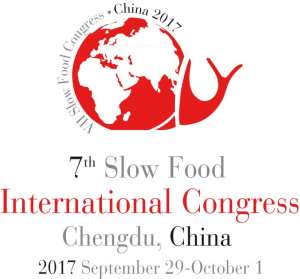
The 7th Slow Food International Congress brings together a large number of delegates from across the world. A total of 400 food activists hailing from 90 countries will convene in the Chinese city of Chengdu from September 29th to October 1st this year.
Given the nature of this event and the commitment of Slow Food to protecting the environment, the organizers’ first goal is to decrease the event’s environmental impact. Slow Food International and Slow Food Great China are both engaged in tackling this challenge.
Since 2006, Slow Food has paid great attention to reducing the environmental impact of its events. Terra Madre Salone del Gusto—Slow Food's biggest biannual event in Turin—is designed so as to minimize its ecological footprint through a holistic approach named Systemic Event Design.
With the Slow Food Congress upon us, we are aware that the greater part of the event's carbon footprint relates to the CO2 emissions generated from the transportation of guests and speakers to China.
This is why Slow Food has chosen South Pole Group as a partner to ensure that the event can be certified as Carbon Neutral by offsetting the emissions generated by the Congress.
The total CO2 emissions of the Congress have been calculated using the sophisticated, user-friendly online tool developed by South Pole Group, which derives emission factors from reliable sources such as Defra . The collaboration with South Pole Group will also allow for Slow Food to compensate these emissions as far as possible.
The emissions generated by the Congress, including flights to and from China, will be compensated for through the Huóshui Grouped Small Hydropower project. This project, located in underdeveloped areas of rural China, contributes to greenhouse gas mitigation by generating hydroelectric power as a clean alternative to the burning of fossil fuels. It is made up of 95 small individual power plants, which use the flow of rivers to generate clean electricity.
The hydropower plants are spread across four provinces, 67 in Chongqing Municipality, 9 in Yunnan Province, 13 in Sichuan Province and 6 in Guizhou Province.
These areas comprise of some of the most disadvantaged and least developed communities in China and are home to diverse ethnic minority groups, each with their own culture and traditions. About 80% of the workers in the company are from ethnic minorities. The project improves local air quality, creates training and employment opportunities and provides water channels that improves farming.
Among the central themes of Slow Food International Congress will be the challenge of climate change. Agriculture and food production represent one of the main causes of climate change, but Slow Food believes they must also be part of the solution.
China is crucial to the world's food system and can play a decisive role in tackling this global challenge. The International Congress will reflect Slow Food’s approach to environmental sustainability and social innovation.




 We’ll no longer tolerate your empty, unwarranted attacks – TUC blasts Prof Adei
We’ll no longer tolerate your empty, unwarranted attacks – TUC blasts Prof Adei
 Bawumia donates GHc200,000 to support Madina fire victims
Bawumia donates GHc200,000 to support Madina fire victims
 IMF to disburse US$360million third tranche to Ghana without creditors MoU
IMF to disburse US$360million third tranche to Ghana without creditors MoU
 Truck owner share insights into train collision incident
Truck owner share insights into train collision incident
 Paramount chief of Bassare Traditional Area passes on
Paramount chief of Bassare Traditional Area passes on
 Two teachers in court over alleged illegal possession of BECE papers
Two teachers in court over alleged illegal possession of BECE papers
 Sunyani: Victim allegedly shot by traditional warriors appeals for justice
Sunyani: Victim allegedly shot by traditional warriors appeals for justice
 Mahama vows to scrap teacher licensure exams, review Free SHS policy
Mahama vows to scrap teacher licensure exams, review Free SHS policy
 Government will replace burnt Madina shops with a new three-story, 120-store fac...
Government will replace burnt Madina shops with a new three-story, 120-store fac...
